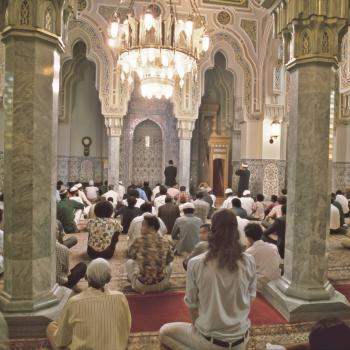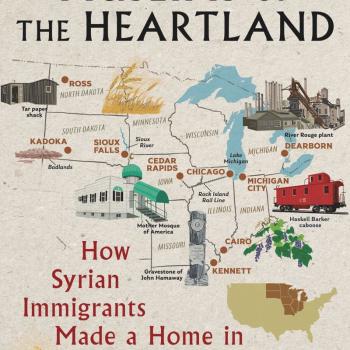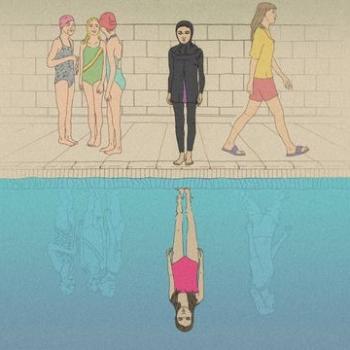In the early 1960s the world was on the brink of a nuclear war because of the escalated tension between the U.S. and the Soviet Union. The crisis made Bertrand Russell write a book titled Has Man a Future, in which the British philosopher criticized human beings’ intoxication with power. Given the fear dominated the world at the time, Russell’s recommendations for future generations were remarkably wise and insightful. Indeed, this book constitutes a great example of a survival crisis leading people to ponder upon life’s bigger questions. I believe the recent pandemic might serve a similar function. Here I will try to draw three lessons from the Coronavirus (COVID-19) pandemic for Muslims. Needless to say, I do not argue these lessons are equally relevant for all Muslims.
1. Be humble.
Like most contemporary cultures, Muslim societies are impressed by what human beings are capable of achieving through science and technology. Indeed we have a right to do so. Scientific projects like CERN and Human Genome Project have immensely contributed to our knowledge and in a way enchanted the disenchanted world. Our lives cannot be compared to those who lived a century ago thanks to the possibilities offered by science and technology. Yet, science and technology did not only make our lives comfortable or make speculating on the mysteries of the universe possible. The comfort and security they provided seem to have an impact on Muslim Weltanschauung. Today many Muslims seem to forget their position vis-à-vis God. Save for the prayers, Muslims feel like they do not need to remember God in their daily lives. Yet from an Islamic perspective God is at the center of our lives and Muslims need God no matter how good their physical, psychological and economic conditions are. Although losing our loved ones temporarily reminds us our place on the ontological ladder, the current pandemic could remind us of our vulnerability, make us witness our limitations more profoundly and restore our relationship with God. Indeed an article published in The Economic Journal in 2019 seems to support this possibility as believers become more religious after natural disasters no matter what their income groups or education levels are.
2. You are not what you consume.
If someone had asked me to write a post-apocalyptic book, toilet paper would have had no place in it. Yet, it became the first thing people started to store along with food and masks as rumors of a possible pandemic-related lockdown first started to spread. No matter what the rationale behind it, people keep panic buying all kinds of stuff since then. Indeed, what we have in the refrigerator or what we have consumed so far does not really matter. We are worse than the greedy peasant Pahom, in Tolstoy’s How Much Land Does a Man Need?. We want more just for the sake of having them. It is not rational yet quite understandable as we want to feel safe and secure. The good thing is that the current pandemic has the potential to teach us a lesson about our pre-pandemic consuming habits. Consuming less may make us question if we really need that much during normal times. This kind of questioning is quite crucial for the world since by consuming more we are contributing to global warming. In just a few weeks NO2 and CO2 emissions fell dramatically due to significant decrease in industrial production and curtailed travel. For Muslims there is an additional problem concerning overconsumption as according to the Quran (6:141) God does not love the wasters. Although some Muslim intellectuals criticized Western countries for selfishly and irresponsibly exploiting natural resources for their own benefit, Muslim modernizers have seen no problem in taking the Western path to modernization and “development”. Nor Muslim masses hesitated to embrace capitalist consuming habits. This can be a great opportunity for us to ponder upon our consuming habits as well as considerable damage we inflict on our planet and our fellow human beings through overconsumption and excessive production.
3. Invest in science
Last week Belarus’ atheist president Alexander Lukashenko ridiculed the fears concerning COVID-19 and argued drinking vodka and visiting saunas would work as a cure for the virus. Similarly, Sunni and Shiite clerics of Pakistan refused to suspend congregational prayers. All rational people, on the other hand, regardless of their religious views or lack of them are taking this virus seriously and are expecting scientists to find a coronavirus treatment. Yet what are the odds that a scientist from a Muslim-majority country will come up with a treatment? Probably very small. Yes, there are great Muslim scientists like Nobel Prize laureate Aziz Sancar from the University of North Carolina or Princeton’s Adel Mahmoud, who developed several lifesaving vaccines. But unfortunately it is hard to believe that they would have had a similar success if they had pursued their careers in their home countries. So what is missing in the Muslim majority countries? Obviously the answer to this question goes far beyond the scope of this piece but one big deficiency has been the funding and organization of scientific studies. Scientific endeavor can be achieved only in well-established organizations. Yet, when someone speaks of a well-established scientific organization in the Muslim World the first thing that comes to a layman’s mind is going to be Bayt al-Hikmah (House of Wisdom) -a ninth-century Abbasid translation center and academic institution. As if Muslims had stopped existing for a millennium… Today Muslim leaders spend hundreds of billions of dollars to fight each other and oppress their own people while enriching American, Russian and French arms industries. Yes, the economic disparity in the world cannot be fully apprehended without recalling a history full of colonization, exploitation and dependency relations. But it is one thing to recognize those factors and it is yet another to blame everything on Western policies. I think the current health crisis, and especially our “let others find a solution” strategy would rather make us harsher critics of ourselves.
Contemplation as the Sixth Pillar of Islam
Traditionally Muslims formulated five pillars of Islam as profession of faith, prayer, fasting, helping the needy and pilgrimage to Mecca. Despite the existence of many verses on deep thinking, Muslims have not seen contemplation as a pillar of their religion. Certainly this limited formulation has something to do with -if not responsible for- some of the problems we face in the contemporary Muslim world. Hopefully this pandemic turns out to be an opportunity in disguise and leads us to ponder upon those lessons.














